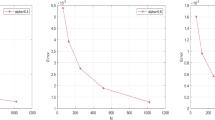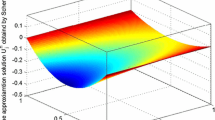Abstract
A set of high-order compact finite difference methods is proposed for solving a class of Caputo-type fractional sub-diffusion equations in conservative form. The diffusion coefficient of the equation may be spatially variable, and the proposed methods have the global convergence order \(\mathcal{O}(\tau ^{r}+h^{4})\), where \(r\ge 2\) is a positive integer and \(\tau \) and h are the temporal and spatial steps. Such new high-order compact difference methods greatly improve the known methods in the literature. The local truncation error and the solvability of the methods are discussed in detail. By applying a discrete energy technique to the matrix form of the methods, a rigorous theoretical analysis of the stability and convergence of the methods is carried out for the case of \(2\le r\le 6\), and the optimal error estimates in the weighted \(H^{1}\), \(L^{2}\) and \(L^{\infty }\) norms are obtained for the general case of variable coefficient. Applications are given to two model problems, and some numerical results are presented to illustrate the various convergence orders of the methods.
Similar content being viewed by others
References
Klages, R., Radons, G., Sokolov, I.M.: Anomalous Transport: Foundations and Applications. Wiley-VCH, Weinheim (2008)
Bouchaud, J.-P., Georges, A.: Anomalous diffusion in disordered media: statistical mechanisms, models and physical applications. Phys. Rep. 195, 127–293 (1990)
Gorenflo, R., Mainardi, F., Moretti, D., Paradisi, P.: Time fractional diffusion: a discrete random walk approach. Nonlinear Dyn. 29, 129–143 (2002)
Metzler, R., Klafter, J.: The random walk’s guide to anomalous diffusion: a fractional dynamics approach. Phys. Rep. 339, 1–77 (2000)
Chen, C., Liu, F., Turner, I., Anh, V.: Numerical schemes and multivariate extrapolation of a two-dimensional anomalous sub-diffusion equation. Numer. Algorithms 54, 1–21 (2010)
Yuste, S.B., Acedo, L.: An explicit finite difference method and a new Von-Neumann type stability analysis for fractional diffusion equations. SIAM J. Numer. Anal. 42, 1862–1874 (2005)
Mohebbi, A., Abbaszade, M., Dehghan, M.: A high-order and unconditionally stable scheme for the modified anomalous fractional sub-diffusion equation with a nonlinear source term. J. Comput. Phys. 240, 36–48 (2013)
Wang, Z., Vong, S.: Compact difference schemes for the modified anomalous fractional sub-diffusion equation and the fractional diffusion-wave equation. J. Comput. Phys. 277, 1–15 (2014)
Deng, W.: Finite element method for the space and time fractional Fokker–Planck equation. SIAM J. Numer. Anal. 47, 204–226 (2009)
Liu, Q., Liu, F., Turner, I., Anh, V.: Finite element approximation for a modified anomalous subdiffusion equation. Appl. Math. Model. 35, 4103–4116 (2011)
Ford, N.J., Xiao, J., Yan, Y.: A finite element method for the time fractional partial differential equations. Fract. Calc. Appl. Anal. 14, 454–474 (2011)
Li, X., Xu, C.: A space-time spectral method for the time fractional diffusion equation. SIAM J. Numer. Anal. 47, 2108–2131 (2009)
Lv, C., Xu, C.: Error analysis of a high order method for time-fractional diffusion equations. SIAM J. Sci. Comput. 38, A2699–A2724 (2016)
Zhang, Y.N., Sun, Z.Z.: Alternating direction implicit schemes for the two-dimensional fractional sub-diffusion equation. J. Comput. Phys. 230, 8713–8728 (2011)
Wang, Y.-M., Wang, T.: Error analysis of a high-order compact ADI method for two-dimensional fractional convection-subdiffusion equations. Calcolo 53, 301–330 (2016)
Liu, Q., Gu, Y.T., Zhuang, P., Liu, F., Nie, Y.F.: An implicit RBF meshless approach for time fractional diffusion equations. Comput. Mech. 48, 1–12 (2011)
Zoppou, C., Knight, J.H.: Analytical solution of a spatially variable coefficient advection–diffusion equation in up to three dimensions. Appl. Math. Model. 23, 667–685 (1999)
Lai, M., Tseng, Y.: A fast iterative solver for the variable coefficient diffusion equation on a disk. J. Comput. Phys. 208, 196–205 (2005)
Zhao, X., Xu, Q.: Efficient numerical schemes for fractional sub-diffusion equation with the spatially variable coefficient. Appl. Math. Model. 38, 3848–3859 (2014)
Cui, M.: Compact exponential scheme for the time fractional convection–diffusion reaction equation with variable coefficients. J. Comput. Phys. 280, 143–163 (2015)
Cui, M.: Combined compact difference scheme for the time fractional convection–diffusion equation with variable coefficients. Appl. Math. Comput. 246, 464–473 (2014)
Vong, S., Lyu, P., Wang, Z.: A compact difference scheme for fractional sub-diffusion equations with the spatially variable coefficient under Neumann boundary conditions. J. Sci. Comput. 66, 725–739 (2016)
Alikhanov, A.A.: A new difference scheme for the time fractional diffusion equation. J. Comput. Phys. 280, 424–438 (2015)
Sun, Z.Z., Wu, X.N.: A fully discrete difference scheme for a diffusion-wave system. Appl. Numer. Math. 56, 193–209 (2006)
Lin, Y., Xu, C.: Finite difference/spectral approximations for the time-fractional diffusion equation. J. Comput. Phys. 225, 1533–1552 (2007)
Gao, G.H., Sun, Z.Z., Zhang, H.: A new fractional numerical differentiation formula to approximate the Caputo fractional derivative and its applications. J. Comput. Phys. 259, 33–50 (2014)
Cao, J.X., Li, C.P., Chen, Y.Q.: High-order approximation to Caputo derivatives and Caputo-type advection–diffusion equations (II). Fract. Calc. Appl. Anal. 18, 735–761 (2015)
Li, C.P., Wu, R.F., Ding, H.F.: High-order approximation to Caputo derivative and Caputo-type advection–diffusion equations. Commun. Appl. Ind. Math. 6, e-536 (2015)
Li, H.F., Cao, J.X., Li, C.P.: High-order approximations to Caputo derivatives and Caputo-type advection–diffusion equations (III). J. Comput. Appl. Math. 299, 159–175 (2016)
Ji, C.C., Sun, Z.Z.: A high-order compact finite difference scheme for the fractional sub-diffusion equation. J. Sci. Comput. 64, 959–985 (2015)
Ji, C.C., Sun, Z.Z.: The high-order compact numerical algorithms for the two-dimensional fractional sub-diffusion equation. Appl. Math. Comput. 269, 775–791 (2015)
Wang, Y.-M.: A high-order compact finite difference method and its extrapolation for fractional mobile/immobile convection–diffusion equations. Calcolo 54, 733–768 (2017)
Lubich, C.: Discretized fractional calculus. SIAM J. Math. Anal. 17, 704–719 (1986)
Li, C.P., Ding, H.F.: Higher order finite difference method for the reaction and anomalous-diffusion equation. Appl. Math. Model. 38, 3802–3821 (2014)
Hao, Z.P., Lin, G., Sun, Z.Z.: A high-order difference scheme for the fractional sub-diffusion equation. Int. J. Comput. Math. 94, 405–426 (2017)
Chen, M.H., Deng, W.H.: Fourth order accurate scheme for the space fractional diffusion equations. SIAM J. Numer. Anal. 52, 1418–1438 (2014)
Ding, H.F., Li, C.P.: High-order numerical algorithms for Riesz derivatives via constructing new generating functions. J. Sci. Comput. 71, 759–784 (2017)
Ding, H.F., Li, C.P.: High-order algorithms for Riesz derivative and their applications (III). Fract. Calc. Appl. Anal. 19, 19–55 (2016)
Zeng, F., Li, C.P., Liu, F., Turner, I.: Numerical algorithms for time-fractional subdiffusion equation with second-order accuracy. SIAM J. Sci. Comput. 37, A55–A78 (2015)
Zeng, F.: Second-order stable finite difference schemes for the time-fractional diffusion-wave equation. J. Sci. Comput. 65, 411–430 (2014)
Zeng, F., Zhang, Z., Karniadakis, G.: Fast difference schemes for solving high-dimensional time-fractional subdiffusion equations. J. Comput. Phys. 307, 15–33 (2016)
Zeng, F., Li, C.P., Liu, F., Turner, I.: The use of finite difference/element approaches for solving the time-fractional subdiffusion equation. SIAM J. Sci. Comput. 35, A2976–A3000 (2013)
Cao, W., Zeng, F., Zhang, Z., Karniadakis, G.: Implicit–explicit difference schemes for nonlinear fractional differential equations with nonsmooth solutions. SIAM J. Sci. Comput. 38, A3070–A3093 (2016)
Yang, J.Y., Huang, J.F., Liang, D.M., Tang, Y.F.: Numerical solution of fractional diffusion-wave equation based on fractional multistep method. Appl. Math. Model. 38, 3652–3661 (2014)
Guo, B.Y., Wang, Y.-M.: An almost monotone approximation for a nonlinear two-point boundary value problem. Adv. Comput. Math. 8, 65–96 (1998)
Wang, Y.-M., Guo, B.Y.: A monotone compact implicit scheme for nonlinear reaction-diffusion equations. J. Comput. Math. 26, 123–148 (2008)
Zhao, X., Sun, Z.Z.: Compact Crank–Nicolson schemes for a class of fractional Cattaneo equation in inhomogeneous medium. J. Sci. Comput. 62, 747–771 (2015)
Wu, R.F., Ding, H.F., Li, C.P.: Determination of coefficients of high-order schemes for Riemann–Liouville derivative. Sci. World J. 2014, Article ID 402373, 21 pp (2014)
Ding, H.F.: Finite difference methods for fractional partial differential equations. Doctoral Dissertation, Shanghai University (2014)
Samko, S., Kilbas, A., Marichev, O.: Fractional Integrals and Derivatives: Theory and Applications. Gordon and Breach, Yverdon (1993)
Zorich, V.A.: Mathematical Analysis II. Springer, Berlin (2004)
Li, C.P., Cai, M.: High-order approximation to Caputo derivatives and Caputo-type advection–diffusion equations: revisited. Numer. Funct. Anal. Opt. 38, 861–890 (2017)
Varga, R.S.: Matrix Iterative Analysis. Springer, Berlin (2000)
Chan, R., Jin, X.: An Introduction to Iterative Toeplitz Solvers. SIAM, Philadelphia (2007)
Samarskii, A.A.: The Theory of Difference Schemes. Marcel Dekker, Inc., New York (2001)
Dimitrov, Y.: Numerical approximations for fractional differential equations. J. Fract. Calc. Appl. 5, 1–45 (2014)
Gustafsson, B.: High Order Difference Methods for Time Dependent PDE. Springer, Berlin (2008)
Isaacson, E., Keller, H.B.: Analysis of Numerical Methods. Dover Publications, Inc., New York (1994)
Diethelm, K.: The Analysis of Fractional Differential Equations. Springer, Berlin (2010)
Acknowledgements
The authors would like to thank the referees for their valuable comments and suggestions which improved the presentation of the paper.
Author information
Authors and Affiliations
Corresponding author
Additional information
This work was supported by Science and Technology Commission of Shanghai Municipality (STCSM) (No. 13dz2260400).
Appendix
Appendix
Proof of Proposition 5.1
“\(\Longrightarrow \)”: It follows from the result (1) of Lemma 2.2 with \(r_{0}=r\).
“\(\Longleftarrow \)”: Let \(y_\mathrm{ex}(t)\) be the extension defined by (2.9) (with r replaced by \(r+1\)). Since \(y^{(k)}(0)=0\) for \(k=0,1,\dots ,r\), we have from the proof of the result (1) of Lemma 2.2 (with \(r_{0}=r\) and \(r^{\prime }=r+1\)) that
This implies that the function \(|\omega |^{r+\alpha } \left| \hat{y}_\mathrm{ex}(\omega ) \right| \) is integrable on \(\mathbb {R}\) because of \(2-\alpha >1\), and so \(y_\mathrm{ex}(t)\in \mathscr {C}^{r+\alpha }(\mathbb {R})\), i.e., \(y(t)\in \mathscr {C}^{r+\alpha }[0,T]\). \(\square \)
Proof of Proposition 5.2
Since \(u(x,t)\in C^{0,1}([0,L]\times [0,T])\) and \(\mathcal{L}u(x,t)\in C^{0,1}([0,L]\times [0,T])\), we apply the Caputo fractional derivative operator \({_{~0}^{C}}\mathcal{D}_{t}^{1-\alpha }\) to the governing equation of (1.1) and make use of Lemma 3.13 in [59] to obtain
By Lemma 3.11 in [59], \({_{~0}^{C}}\mathcal{D}_{t}^{1-\alpha }( \mathcal{L}u )(x,0)=0\). This proves (5.3). \(\square \)
Proof of Proposition 5.3
By integrating by parts, we have that for \(p=1,2,\dots ,r-1\),
This shows that for \(p=1,2,\dots ,r-1\),
Similarly, for \(p=2,3,\dots ,r\),
Differentiating the governing equation of (1.1) p times with respect to t and then solving for \(\partial _{t}^{p}(\mathcal{L}u)(x,t)\), we obtain
This implies that for \(x\in [0,L]\),
Differentiating the Eq. (A.1) \(p-1\) times with respect to t yields
and so for \(x\in [0,L]\),
By Lemma 3.11 in [59], \({_{~0}^{C}}\mathcal{D}_{t}^{\alpha }(\partial _{t}^{p}u)(x,0)=0\) for \(p=1,2,\dots ,r-1\) and \({_{~0}^{C}}\mathcal{D}_{t}^{1-\alpha }(\partial _{t}^{p-1}(\mathcal{L}u))(x,0)=0\) for \(p=2,3,\dots ,r\). Then the result (5.4) follows by (A.3) and (A.6), and the result (5.5) follows by (A.4) and (A.8). The proof is completed. \(\square \)
Rights and permissions
About this article
Cite this article
Wang, YM., Ren, L. High-Order Compact Difference Methods for Caputo-Type Variable Coefficient Fractional Sub-diffusion Equations in Conservative Form. J Sci Comput 76, 1007–1043 (2018). https://doi.org/10.1007/s10915-018-0647-4
Received:
Revised:
Accepted:
Published:
Issue Date:
DOI: https://doi.org/10.1007/s10915-018-0647-4
Keywords
- Fractional sub-diffusion equation
- Variable coefficient
- Compact difference method
- High-order convergence
- Energy method




